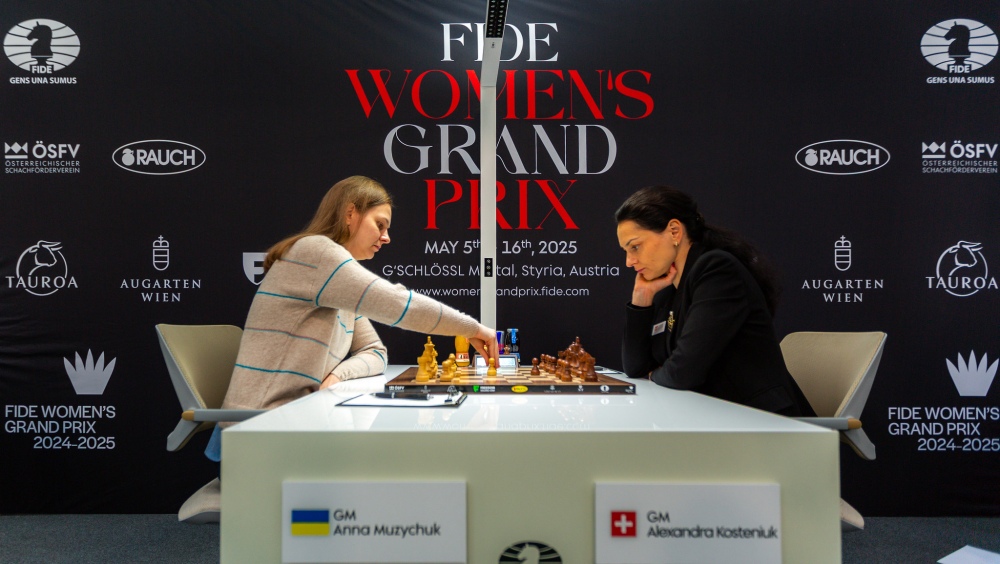FIDE WGP Austria: Anna Muzychuk takes the lead in a round of pawn sacrifices

Ukrainian Anna Muzychuk had a great showing against the former Women’s World Champion Alexandra Kosteniuk, taking her to 3.5/4 and a sole lead in the tournament. Out of five games, three saw players making or offering a pawn sacrifice. Round four of the final stage of the 2024/2025 FIDE Women’s Grand Prix was marked by fast games and questionable pawn sacrifices. As it turned out, those who accepted the pawn offer – such as Dzagnidze (playing as White against Tan) and Badelka (playing as Black against Salimova), won. Vaishali Rameshbabu, who declined a free pawn from Mariya Muzychuk, was left defending a draw. Nana Dzagnidze’s game against former Women’s World Champion Tan Zhongyi stood out with its sharp moves and impressive tactics. After securing a win as White, Nana is now alone in third place. Meanwhile, fellow Georgian Lela Javakhishvili blundered an even endgame and lost to Zhu in a match everyone thought would be the first to finish in a draw. In the matchup of the day, Alexandra Kosteniuk launched an early surprise against Anna Muzychuk by essaying the French Defence. However, in the Winawer Variation, Muzychuk staged her own surprise with an early 5.Qg4. On move six Alexandra deviated from the most popular continuations and opted for 6…d4, a move rarely seen at the top level. Just two three moves down the road, after a 25-minute think, Kosteniuk made a serious error, playing 9…Nd5? Black should have continued by taking on c3, doubling White’s pawns and then take on e5. Another alternative for Black to consider was 9…b5 which looks even stronger. As played, White got a chance to pin Black’s pieces and develop at the same time: 10.Bd2 Nxc3 and now, an important intermezzo 11.Rc1! After 11…Bxc3 12.Bxc3 Qb6 targeting f2, Anna responded with 13.Qf4! defending f2 and preserving an extra pawn. After exchanges on the queenside, the two soon transitioned to an endgame with rooks and queens. This is the last moment in the game where Black had a chance to put up a stronger resistance. Instead of 27…f5 Alexandra played 27…Rg5? This allowed White to proceed with coordinating her rooks and executing an exchange in the centre after which she was completely winning. 28.Re4! Kb8 29.g3 a5 30.Rec4 Qb6 31.Rd4! Rf5 32.Qd2 Rfxe5 33.Rxe5 Rxe5 34.Rxg4 Rd5 35.Rd4 Rxd4 36.Qxd4 Qxb2 37.Qd8 – White’s queen is completely dominating, and her king is well protected. The situation is opposite for black. On move 46, Kosteniuk surrendered. An extremely important victory for Muzychuk who ended as the sole leader in the tournament, while Kosteniuk remains on 1.5/4. The most beautiful game of the day was one between Nana Dzagnidze and Tan Zhongyi. In a solid and well-known line of English Opening, Dzagnidze pressed on the queenside while Tan countered in the centre. After erroneously trading the light-square bishops, Tan was all but forced to sacrifice a central pawn, which opened space for her rook to join an attack on the white king’s fortress. Black got her rook into the game and is now going all in, trying to stun White. She just played 21…g5 22.g4! The only move! What is unusual is that this move defied conventional wisdom – don’t open your king’s fortress, let alone do that while at the same time giving up the pawn!? And while this all is true and that is exactly what Nana did in this position, also – she is opening the g-file for her own attack on Black! 22…Qxg4+ 23.Kh1 Kg8 and now comes another deep move by Dzagnidze – 24.Bh8! Tan’s position is extremely difficult to defend and in a few moves, the former World Champion was completely lost. After three long draws, a well-earned win for Dzagnidze, now on 2.5/4. Tan, after starting with two wins, has now lost two in a row and is on 50 percent. Olga Badelka also scored, beating Nurgyul Salimova. In a well-known line of the Italian, playing as White, Salimova went for a position with an isolated pawn in the centre. She soon gave up that central pawn and got almost sufficient compensation in the form of two bishops. Following a tactical battle in the centre around moves 19-25 Salimova got back into the game. The position was equal but, under time pressure, Salimova made a mistake by allowing Black to penetrate her back ranks with 28…Qe2, which led to White’s demise. An important comeback for Badelka following two loses. She is now on 2/4. Salimova continues her winless streak, with 0.5/4. Vaishali Rameshbabu has managed to stage surprises in all three previous games. This time around, playing against Mariya Muzychuk, the Indian seems to have been the one who was surprised as she decided not to play the most obvious move. In a popular line of the Sveshnikov Sicilian, Vaishali had an early chance to pick up a pawn but did not go for it. Vaishali spent just under 30 minutes thinking before deciding not to take the free pawn (which was the strongest continuation) but played 16.Ne3 instead. This allowed Mariya Muzychuk to equalize first and then to grab the initiative. Despite pressing hard on the queenside and pushing White’s pieces back, Mariya surprisingly decided to settle for a draw by a threefold repetition. This is the second time in the tournament (previously it was against Salimova), that Muzychuk opted not to press. Vaishali is on three points, just half a point behind the leader, Anna Muzychuk. The former world champion Mariya Muzychuk is on 1.5/4, with one loss and three draws. The game between Javakhishvili and Zhu Jiner looked set to end quickly in a draw, but instead turned into the day’s longest battle. White (Javakhishvili) emerged slightly better in a well-known line of the Queen’s Indian Defence, but the position was largely even. The first big swing happened late in the ending, when Javakhishvili made a grave mistake that cost her game. Black just moved her king to g6. In this position, White should have just
GM Christopher Yoo temporarily suspended by FIDE Ethics and Disciplinary Commission

The FIDE Ethics and Disciplinary Commission (EDC) has announced a provisional 60-day suspension of Grandmaster Christopher Yoo, effective from May 9, 2025. This action follows the submission of a second complaint alleging harassment, currently under preliminary review. The suspension stems from two separate complaints alleging violations of the FIDE Ethics and Disciplinary Code. Case 5/2025 (A), filed by the United States Chess Federation (USCF), and an additional recent complaint – whose details and complainant remain confidential due to the sensitive nature of the allegations – are both under investigation by the EDC. On November 14, 2024, the US Chess Federation imposed a one-year ban prohibiting GM Christopher Yoo from participating in tournaments under the auspices of USCF. This sanction also includes a five-year probationary period extending through November 14, 2030. Under Article 26.12 of the FIDE Charter, national sanctions may be extended internationally if a member federation requests it and if the decision complies with fundamental legal principles and fair trial standards. In line with this, the USCF formally submitted a request for FIDE to recognize and globally enforce its ban, pursuant to Article 4.15 of the FIDE Ethics Code. This request remains under investigation. Given the gravity of the allegations and the ongoing proceedings, the Chair of the EDC has enacted a temporary suspension of GM Yoo to safeguard the integrity of the investigative process. Both GM Yoo and the USCF have been formally notified of this decision. The suspension may be extended if a final resolution is not reached within the initial 60-day period. This decision aligns with FIDE’s commitment to safeguarding everyone involved in chess and sends a clear message about the importance of fostering a respectful environment for the entire chess community, regardless of gender, age, or status.
Balancing moves and motherhood: ChessMom initiative continues

On the occasion of Mother’s Day, FIDE and the Women’s Commission express appreciation for the many women who contribute to the chess world while also raising families. Balancing the responsibilities of motherhood with a professional chess career is no easy task, and we acknowledge the dedication, strength, and perseverance of these remarkable players. In this spirit, FIDE is proud to announce the return of the ChessMom project for the 2026 Chess Olympiad in Uzbekistan. This initiative reflects FIDE’s continued dedication to supporting women in chess, particularly those who are mothers or expecting. Following overwhelmingly positive feedback from participants during the 2024 Chess Olympiad in Hungary, the ChessMom project will not only continue but expand, ensuring that more players can pursue their chess ambitions without having to choose between career and motherhood. In 2024, six mothers were selected for the inaugural program: Alina Kashlinskaya (Poland) Nana Dzagnidze (Georgia) Yuliia Osmak (Ukraine) Aster Melake Bantiwalu (Ethiopia) Rauha Shipindo (Namibia) Nolwazi Nkwanyane (Eswatini) These players participated in the Olympiad with the support of the ChessMom initiative, which covered the cost of an accompanying caregiver, allowing the players to focus on their games while ensuring their children were cared for. One of the most inspiring stories came from Rauha Shipindo, a Namibian player who competed in her national qualifier just two weeks before giving birth, and then went on to represent her country at the Olympiad, accompanied by her baby and a caregiver. “I am so grateful to those who initiated the ChessMom program. It is trying to close the gap that is there for women. If I have a newborn like this, I might weigh in and say, will I stay to look after my little one, or will I go to the Chess Olympics? So it’s combining that gap and closing it,” Rauha Shipindo said. For Rauha, ChessMom was more than logistical assistance – it was the chance to compete at the highest level without sacrificing her role as a new mother. The program provides financial support to players with infants under one-year-old, allowing them to travel with a companion who can care for the child during competition. As Dana Reizniece, Deputy Chair of the FIDE Management Board, explains: “I think it is important that women in chess feel supported. We cannot take all the barriers for women away, but with programs like ChessMom we want to help professional chess players to balance their career and personal life.” Francisco Javier Cruz Arce, member of the FIDE Women’s Commission and project co-initiator, reaffirms this mission: “We are committed to ensuring that no woman is forced to choose between motherhood and her professional career as a chess player. We are happy that ChessMom continues to grow, raise awareness, and expand. We want mothers who play chess to know that they will not be alone. FIDE is here to support them every step of the way.” The idea for ChessMom was conceived during the 2022 Olympiad in Chennai. Reflecting on its origins, Anastasia Sorokina, Chair of the FIDE Women’s Commission, shared: “The idea for this project was born during the Olympiad in Chennai. While discussing with commission member Francisco Cruz, we spoke about the clear need for such support. For many women chess players who are planning to become mothers, the fear of pausing or ending their professional careers is very real. ChessMom addresses that directly — showing that it is possible to be both a mother and a competitive chess professional. This initiative is more than logistical support; it is a message that women do not have to choose between motherhood and ambition. It gives hope, security, and dignity to women at a critical moment in their lives.” This announcement is a message to all players who are new or expecting mothers: your place in the chess world is secure and celebrated. FIDE encourages you to prepare for participation in your national teams for the 2026 Chess Olympiad. Application details for the next edition of ChessMom will be shared in the coming months.

